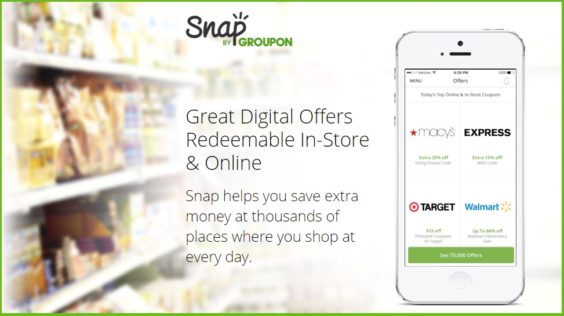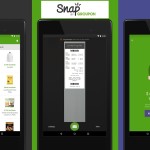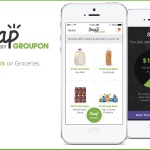
Wondering what the new Snap by Groupon is like? Or have you already deleted it? Well, the former cash-back grocery app has morphed into… Groupon. Or kind of like Groupon Lite.
Two weeks after Groupon announced a “brand new Snap” coming in March, that day has arrived. As first reported on Coupons in the News several days prior to the public announcement, the company behind the Snap grocery rebate app decided to drop the groceries and the rebates, and instead offer the same retailer discounts and coupons that are available on Groupon.com.
Groupon.com and the Groupon app feature a “coupons” tab with a selection of retailer offers similar to what you’d find on a coupon code site like RetailMeNot. And Snap by Groupon is now essentially that “coupons” tab, in app form. Less than that, in fact, since Snap features only a handful of offers. To see more, you have to click a link – which takes you to Groupon.com.
Groupon tried mightily to spin the news of the Snap changes as a “transition” that would be exciting for users. “Snap isn’t winding down,” a company spokesman said in response to Coupons in the News‘ initial inquiries a month ago. “In fact, we’re expanding the number of offers available within Snap to include our inventory of nearly 60,000 coupons and promotions.”
But now that Snap by Groupon has become but a pale shadow of Groupon itself, it’s safe to say at this point that Snap is indeed no more. It’s still around in name, and on a lot of people’s phones, but it’s difficult to see it continuing to coexist along with the Groupon app, when only one is really necessary.
“Unfortunately, it is only an app that now wastes space on my phone,” a commenter wrote on Snap’s Facebook page. “You’ve done a great job on creating a following, and now you’ll get to watch your following walk away slowly.” Added another: “Deleted the app. No use for it now and you’ve stolen the last of the money I should have gotten back.”
Monday was the deadline to request a check from Snap, if you wanted to cash out your balance before the transition. The problem for many, was that you needed to have a $20 balance to cash out. And many users didn’t. So they’ll be getting the equivalent value in “Groupon Bucks” instead, to use toward future Groupon purchases, which the company promises will show up in your account “soon”. If you didn’t already have a Groupon account, you will now, since Snap planned to automatically give you one. But if you don’t use the promotional credits within six months, they’ll expire, and you’ll end up with nothing.
“So I’m about to lose $13 because you haven’t had any decent offers lately for me to get to $20. I think this is unfair. Just let us cash out any balances,” one longtime user complained on Facebook before the change. “I’m not interested in Groupon Bucks,” another commenter wrote. “I paid with real money to earn the rebate. So I expect to be reimbursed the same way,” added a third.
But Snap by Groupon’s terms and conditions always said that you have a “contractual right to payment, not a property right,” which essentially meant that you had the right to request the money from Groupon if you met its $20 threshold, but you didn’t own the money until you met those conditions and Groupon gave it to you.
And all that you’re about to own now is a bunch of Groupon Bucks, if you couldn’t find enough rebates to get you to $20.
The lack of appealing rebates that prevented many users from being able to get their balances up to the threshold, is arguably the reason that Snap underwent its “transition” in the first place. After acquiring SnapSaves, a Canadian app that launched in August 2013, Groupon debuted its rebranded app a year later, vowing to use “the power of smartphones to make couponing easier and more convenient while paying people to shop.”
Months earlier, then-CEO Eric Lefkofsky envisioned Groupon becoming “the great mobile-commerce company of the next decade.” But he was replaced a year later, and the Snap app apparently fell off the company’s list of priorities. The app wasn’t mentioned once in Groupon’s 147-page 2015 annual report.
In a memo to employees late last year, new CEO Rich Williams offered some hints about the company’s future that, in retrospect, might have foretold the fate of Snap.
“On more than one occasion, we’ve been overly enthusiastic about the potential impact of new products, and we’ve been wrong more than once,” Williams wrote. “Not every test will come out beaming rainbows and unicorns.” The company’s new focus, he said, was “simplifying and streamlining our business,” “moving to more shared services” and “driv(ing) millions more new customers to our marketplace.”
Eliminating a grocery app that never really fit into Groupon’s business model is certainly “simplying and streamlining” things. Mirroring Groupon’s existing offers on the new Snap would count as “moving to shared services.” And giving Snap users Groupon Bucks and automatically signing them up for Groupon accounts could serve to “drive millions more new customers to our marketplace.”
Unfortunately, that transition involved “sunsetting Snap’s cash back feature,” as Groupon put it euphemistically. “I just cashed out. Will be ‘sunsetting’ my Snap account,” one disgruntled user wrote in response.
And now, along with their cash balances, Groupon can only hope that most Snap users won’t disappear as well.











Their little contract with their consumers doesn’t mean they didn’t commit some sort of fraud on the manufacturers.
They say their app has 60,000 offers on it – I have taken a quick look at it & there’s not even anyway to sort them, search them, etc. What a joke.
Thanks for the contractual info part. I was thinking this might be a good case for a class action suit (not filed by me…just a general thought)..but that piece of the contract really sorta puts the kibosh on anything like that I guess. As always- very informative reporting! Thanks 🙂
You are quite welcome! So no lawsuits, but lots of disappointments. Wonder how much they will “make” in the end, from balances that turn into unredeemed Groupon Bucks.
This is what bothers me from an ethical standpoint, Groupon acted as the intermediary between manufacturers and customers, taking the manufacturers’ promotional budgets and “giving” it to customers who met the offer requirements. Of course, Groupon was also earning a nominal fee per offer for administrative costs.
Now, all the abandoned “Groupon Bucks” left over after 6 months will magically be an extra profit to Groupon. In effect, the administrative fee of Groupon’s “service” to manufacturers will go through the roof since many customers will ultimately not receive the intended promotion from the manufacturer.